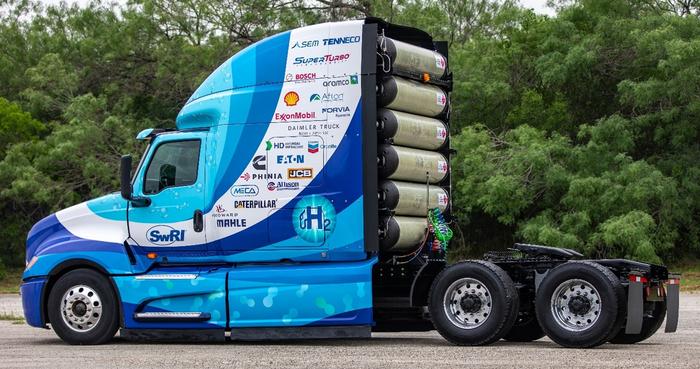Southwest Research Institute (SwRI) has made a significant leap forward in sustainable transportation with the announcement of its latest initiative: the Hydrogen Internal Combustion Engine consortium, cleverly dubbed H2-ICE2. This new consortium follows the successful completion of a Class 8 heavy-duty hydrogen-powered vehicle, a project that encapsulated 18 months of meticulous engineering and innovation. The goal of H2-ICE2 is not merely to continue the work started by its predecessor but to enhance and refine the vehicle’s performance for real-world applications.
Developing a hydrogen-powered internal combustion engine is no small feat. It necessitates not only advanced engineering but also an understanding of how hydrogen behaves as a fuel compared to traditional gasoline or diesel. H2-ICE vehicles operate on internal combustion technology, which, while familiar and established in commercial vehicle manufacturing, takes on new challenges when hydrogen is introduced as the energy source. Achieving efficient combustion while mitigating the formation of nitrogen oxides (NOx) and carbon dioxide (CO2) has been a primary focus area for the consortium.
The initial phase of the H2-ICE initiative showcased impressive outcomes, demonstrating that a hydrogen-fueled Class 8 vehicle could operate effectively without compromising performance. The design emphasizes efficiency in combustion technology, ensuring that the vehicle delivers power akin to conventional diesel engines. However, the need for ongoing advancements is integral; thus, H2-ICE2 will build upon the foundational work to bolster engine efficiency, control heat management, and meet the varying demands of real-world operational conditions.
One of the key advantages of the H2-ICE technology is its compatibility with existing manufacturing processes in the automotive industry. Daniel Stewart, the vice president of SwRI’s Powertrain Engineering Division, highlighted that established production lines and component suppliers around the globe can pivot to support the manufacture of hydrogen-fueled vehicles. This compatibility drastically reduces the barriers to entry for truck manufacturers and helps to accelerate the shift towards hydrogen solutions within commercial trucking.
The first truck developed under the H2-ICE consortium has already demonstrated its capabilities, touring across the nation and showcasing its zero-emission performance to the long-haul trucking industry. This outreach has been critical in familiarizing industry stakeholders with the potential of hydrogen technology, emphasizing that H2-ICE vehicles can serve as more than just a sustainable option—they can retain the performance, reliability, and operational capabilities expected from heavy-duty vehicles.
While the first phase of the H2-ICE initiative focused heavily on performance metrics, H2-ICE2 aims to delve deeper into the varied operational characteristics that may affect hydrogen-powered vehicles in different scenarios. This includes evaluating their performance during cold starts—an essential task for trucks subjected to harsh weather conditions. Continuous ascent, low-demand situations, and operations under no-load conditions will be rigorously tested to ensure that the vehicle can maintain operational integrity in diverse contexts, which is a critical requirement for heavy-duty commercial vehicles.
The consortium will also investigate the opportunities for improved emissions strategies, aiming to enhance torque response and alternative strategies for rapid warm-ups to reduce emissions further. This holistic approach ensures that engineers can identify and address the unique challenges faced by hydrogen vehicles, which can differ significantly from those powered by traditional fuels. Throughout the process, the consortium’s collaborative framework will leverage shared expertise to drive innovation and overcome technical barriers.
As H2-ICE2 prepares for its official launch, the consortium members are invited to participate in a free meeting where the goals, objectives, and vision for the future will be discussed. This engagement promotes collaboration and innovation among industry stakeholders, fostering a community dedicated to achieving not only technological advancements but also meaningful progress toward reducing carbon emissions. With many options for energy transformation available, the H2-ICE initiative positions itself at the forefront of the sustainable transportation movement.
In summary, the launch of H2-ICE2 by Southwest Research Institute not only underscores an encouraging trend in vehicle innovation but also represents a critical challenge to the status quo in heavy-duty transportation. It embodies a proactive approach to harnessing hydrogen’s potential, fostering collaboration, and accelerating advancements tailored to addressing the global climate crisis. As the world continues to seek alternatives to fossil fuels, initiatives such as H2-ICE2 will likely play an increasingly central role in reshaping the landscape of the transportation industry and steering it towards a sustainable and environmentally responsible future.
Subject of Research: Hydrogen Internal Combustion Engine Technology
Article Title: SwRI Powers Up Hydrogen Revolution with H2-ICE2 Initiative
News Publication Date: March 25, 2025
Web References: https://www.swri.org/events/h2-ice2-consortium-kick
References: https://www.swri.org/industry/hydrogen-powered-vehicles/hydrogen-internal-combustion-engine-h2-ice-consortium?utm_campaign=h2-ice-consortium-pr&utm_source=eurekalert!&utm_medium=referral
Image Credits: Credit: Southwest Research Institute
Keywords
Sustainable transport, hydrogen fuel, internal combustion engine, emissions reduction, trucking industry, environmental technology, clean energy innovation, engineering advancements, vehicle performance, hydrogen energy, carbon neutrality, H2-ICE consortium.
Tags: alternative fuel vehiclescarbon emissions reductionclean energy solutionscombating climate change with hydrogenH2-ICE2 consortiumheavy-duty hydrogen-powered vehicleshydrogen fuel advancementsHydrogen Internal Combustion Enginelong-haul trucking sustainabilitynear-zero emissions technologysustainable transportation initiativesSwRI engineering innovations





